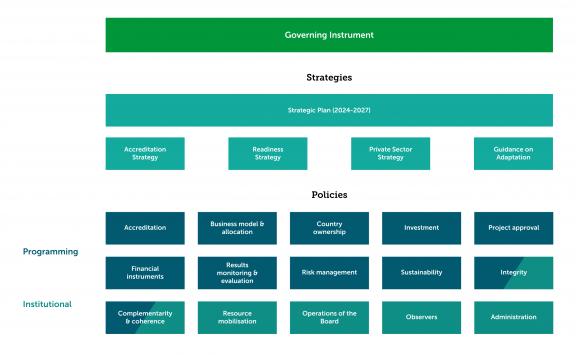Policies & strategies
Policies and strategies
As part of its mandate, the GCF Board approves specific operational policies and guidelines, including for programming, project cycle, administration, and financial management. The Board also approves strategies, which guide the overall direction of Fund operations. Together, these strategies and policies establish the framework for implementation of the GCF’s Governing Instrument.
The main GCF policy frameworks, aligned with the Governing Instrument and strategies, are shown in the diagram below.

Governing Instrument
The Governing Instrument for the Green Climate Fund was approved by the Conference of the Parties to the United Nations Framework Convention on Climate Change (UNFCCC) at its seventeenth session on 11 December 2011 in Durban, South Africa.
Strategic plan & other strategies
In advance of the second Replenishment period the Board updated its Strategic Plan for 2024-2027 at B.36, setting out the major programming directions and operational and institutional priorities for GCF-2. GCF’s initial Strategic Plan was adopted in 2016 for the Initial Resource Mobilization period (2015-2019) and was then updated in 2020 for the GCF first replenishment period (2020-2023).
Private sector strategy
The Board adopted at B.32 the Private Sector Strategy, which sets out the four pillars through which the GCF aims to catalyze private climate finance in a country-driven manner to meet developing countries’ needs and the objectives of the Updated Strategic Plan.
Guidance on adaptation
The Board welcomed at B.33 the Guidance on adaptation which speaks to the GCF’s vision, strategic approach, and scope for supporting adaptation programming, and how the GCF aims to deliver this through its range of modalities that support adaptation activities.
Accreditation strategy
The Board adopted at B.34 the Accreditation Strategy, which clarifies the GCF operating model and guides the evolution of the GCF network of AEs in order to deliver on the GCF’s mandate, objectives and programming directions.
Readiness strategy 2024-2027
The Board adopted at B.37 the Readiness Strategy 2024-2027, which presents the revised strategy for the Readiness Programme that continues to serve as a critical instrument in fulfilling the GCF’s strategic vision and ambition.
Policies
GCF policy frameworks generally include a mix of top-level policies adopted by the Board to govern a specific subject matter, the related Board decisions which adopt the policies and may contain additional policy provisions, and other policy instruments (such as standards or guidelines) which further elaborate how policies should be operationalized.
Clicking on the boxes will take you to the policies in each framework. Alternately, you can search across the entire suite of policies through the search function below.
Search policies & strategies
| Title | Theme | Date |
|---|---|---|
|
Guidance on the GCF’s vision, approach and scope for providing support to enhance climate adaptation The Board welcomed at B.33 the Guidance on adaptation which speaks to the GCF’s vision, strategic approach, and scope for supporting adaptation programming, and how the GCF aims to deliver this through its range of modalities that support adaptation activities. |
20 Jul 2022 | |
|
Procedures for adopting decisions in the event that all efforts at reaching consensus have been exhausted |
Operations of the Board | 19 May 2022 |
|
Updated simplified approval process and activity cycle Adopted by decision B.32/05; applicable from B.32 onwards. Updates the Simplified Approval Process including the size and risk categories eligible under this funding window. |
Project approval | 19 May 2022 |
|
Private Sector Strategy The Board adopted at B.32 the Private Sector Strategy, which sets out the four pillars through which the GCF aims to catalyze private climate finance in a country-driven manner to meet developing countries’ needs and the objectives of the Updated Strategic Plan. |
19 May 2022 | |
|
Guidelines to determine in which cases decisions without a Board meeting may be requested Adopted by decision B.32/11. Sets out the circumstances and conditions for when a decision without a Board meeting may be requested. |
Operations of the Board | 19 May 2022 |
|
Guidance in respect of the implementation of paragraph 43 of the Rules of Procedure of the Board and other related matters Adopted by decision B.32/11. Elaborates guidance for management of objections pertaining to decisions without a Board meeting. |
Operations of the Board | 19 May 2022 |
|
Terms of reference of the Performance Oversight Committee of the Executive Director and Heads of Independent Units |
Terms of reference | 19 May 2022 |
|
Revised environmental and social policy Adopted by decision B.BM-2021/18; applicable to all projects from B.32 onwards. Revises the environmental and social policy to reaffirm the Fund's commitment to addressing Sexual Exploitation, Sexual Abuse, and Sexual Harassment in addition to environmental and social considerations in its funded activities. |
Sustainability | 13 Sep 2021 |
|
Revised initial financial risk management framework Sets out the financial risk policies, risk monitoring and reporting, and risk governance components, as updated by the Risk Management Committee. |
Risk management | 30 Jul 2021 |
|
Integrated results management framework Adopted by decision B.29/01; applicable from B.32 onwards. Establishes an updated results management framework that integrates and supersedes the initial results management framework and performance measurement frameworks, to allow the Fund to measure and report the impact of its investments. |
Results, monitoring & evaluation | 16 Jul 2021 |